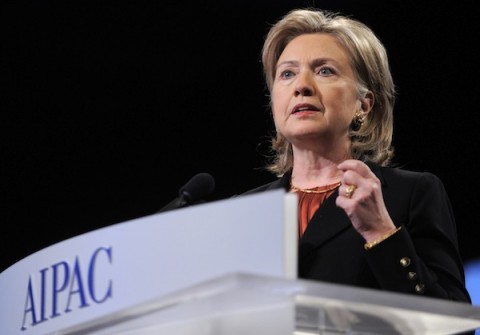Clinton Declares U.S. Bond With Israel ‘Rock Solid’
The secretary of state made a case that intransigence on a two-state solution was against Israeli interests.
Jul 31, 202042.1K Shares628.6K Views
Secretary of State Hillary Rodham Clinton addresses AIPAC on Monday. (EPA/ZUMApress.com)
Setting nearly two weeks’ worth of diplomatic acrimony behind her, Secretary of State Hillary Rodham Clinton delivered a passionate address to the U.S.’s largest pro-Israel lobbying organization, declaring the the U.S.’ bond to Israel to be “rock solid,” and gently challenging the Israeli government to commit wholeheartedly to a two-state solution for the Israeli-Palestinian conflict.
[Security1] In a rhetorical flourish to play down the tension over Israel’s announcement of Jerusalem settlement expansions during a visit by Vice President Biden, Clinton said the settlement move “exposes daylight between Israel and the United States that others in the region could hope to exploit.” That line implicitly rebuked Israel’s more conservative American defenders over the fracas, who have said that Obama’s reaction — that the Israelis “insulted” the U.S. — was the problem, not the settlement expansion itself. Clinton, speaking to the America Israel Public Affairs Committee’s annual policy conference at the Washington Convention Center, effectively shifted the burden of the division onto Israeli Prime Minister Benjamin Netanyahu, who will address the conference early on Monday evening.
That set the tone for the message Clinton sought to deliver on the need to reinvigorate Mideast peace talks, starting with the new indirect talks the U.S. is brokering: she said the peace process exists within the context of a strong U.S.-Israel bond, and never suggested that the U.S. views Israeli cooperation on a two-state solution as a diplomatic dealbreaker. By contrast, Clinton made a case that intransigence on a two-state solution was against the Israeli interest. “The inexorable mathematics of demography are hastening the hour at which Israelis may have to choose between preserving their democracy and staying true to the dream of a Jewish homeland,” Clinton said, a statement for which she received no applause from the assembled pro-Israel activists.
The secretary received a more fervent reception by forcefully denouncing Iran’s nuclear ambitions, the fulfillment of which AIPAC executive director Howard Kohl called an “overarching imperative” that “no other issue can be allowed to detract, distract or derail.” She called on Hamas, the terrorist organization that controls the Gaza Strip, to “renounce violence, recognize Israel, and abide by previous signed agreements” and gave no indication that it would be invited to peace talks. And she tied President Obama — about whom AIPAC maintains a somewhat skeptical view, despite 78 percent of American Jews voting for him in 2008— to Jewish history, saying he and his family “have lived the Diaspora experience.”
With a deftness to what her audience wished to hear, Clinton said that “reaching a two-state solution will not end all these threats” to Israel’s security, an article of faith among the pro-Israel community, but immediately added that “failure to do so gives our extremist foes a pretext to spread violence, instability, and hatred.”
At the same, Clinton did not use the speech to outline additional commitments the U.S. expects Israel to fulfill, saying instead that both Israel and the Palestinians ought not to issue “unilateral statements and actions that undermine the process.” Nor did Clinton unveil any U.S. peace plan, as some advocates of a two-state solution had hoped she would, let alone chastise Israel for additional settlement activity that the Israeli peace organization Peace Now has identified as being in the planning stages. The closest she came was to urge Netanyahu to “continue” building “trust and momentum toward comprehensive peace by demonstrating respect for the legitimate aspirations of the Palestinians, stopping settlement activity, and addressing the humanitarian crisis in Gaza,” all of which fall short of new concrete responsibilities for Israel.
Hadar Susskind, the policy and strategy director for J Street, AIPAC’s younger and more progressive counterpart organization, saidClinton “obviously knows and understands intimately the room she’s in,” but praised the substance of the secretary’s message. “She did a good job of saying we’re all coming at this from the same goals,” Susskind said. “She said, look, we don’t think this [Jerusalem settlement expansion] is in the best interest of Israel, and we’re going to continue to do what we can to bring the parties to the table for direct talks.”
Clinton did not disclose any details of any diplomatic assurances Netanyahu conveyed to her before the weekend, a move that cleared Mideast envoy George Mitchell to return to the region over the weekend and for Netanyahu to receive a White House reception Tuesday. Before Netanyahu addresses AIPAC, his chief political rival, Kadima Party leader Tzipi Livni, will deliver a speech to AIPAC delegates at 2 p.m.

Rhyley Carney
Reviewer
Latest Articles
Popular Articles
